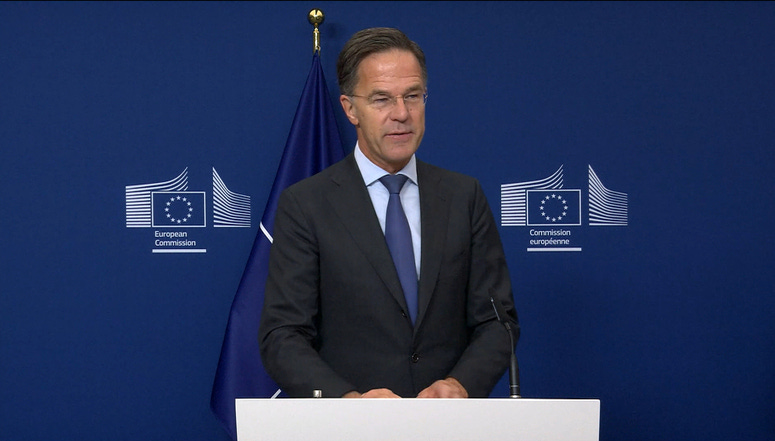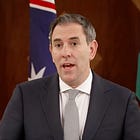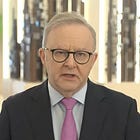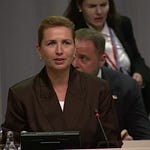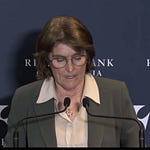This piece is freely available to read. Become a paid subscriber today and help keep Mencari News financially afloat so that we can continue to pay our writers for their insight and expertise.
Today’s Article is brought to you by Empower your podcasting vision with a suite of creative solutions at your fingertips.
Video courtesy by NATO
European Commission President Ursula von der Leyen unveiled plans Tuesday for a reparations loan backed by immobilized Russian assets to provide long-term military support to Ukraine, marking a significant shift in how the European Union finances assistance to Kyiv.
Von der Leyen announced the proposal during a security meeting with NATO Secretary General Mark Rutte, saying the loan would be dispersed in tranches with conditions attached and partly used to procure weapons from European defense manufacturers.
“We need a more structural solution for military support, and this is why I have put forward the idea of a reparations loan that is based on the immobilized Russian assets,” von der Leyen said. “The loan would not be dispersed in one go, but in tranches and with conditions attached.”
The proposal does not involve seizing Russian assets outright. Instead, Ukraine would repay the loan if Russia pays reparations for its invasion.
“Importantly, there is no seizing of the assets,” von der Leyen said. “Ukraine has to repay the loan if Russia is paying reparations. If Russia is paying reparations, the perpetrator must be held responsible.”
Truth matters. Quality journalism costs.
Your subscription to Mencari directly funds the investigative reporting our democracy needs. For less than a coffee per week, you enable our journalists to uncover stories that powerful interests would rather keep hidden. There is no corporate influence involved. No compromises. Just honest journalism when we need it most.
Not ready to be paid subscribe, but appreciate the newsletter ? Grab us a beer or snag the exclusive ad spot at the top of next week’s newsletter.
The announcement came as Russia’s war in Ukraine enters its fourth year, with von der Leyen citing the conflict’s duration at three years and seven months since the February 2022 invasion.
Von der Leyen said Ukraine has ceded virtually no territory this year despite sustained Russian pressure, capturing what she described as impressive resistance on the battlefield.
“You know the figure that in the last 1,000 days, Russia only captured 1% of the occupied territory of Ukraine, and this despite more than a quarter of a million Russian lives lost on the battlefield,” she said.
The commission president said Russia faces mounting economic pressure, with interest rates at 17% and inflation exceeding 10%. She projected Russia’s GDP growth would fall from 4.3% in 2024 to 0.9% in 2025.
“I believe firmly that we are at a moment where decisive action on our side can lead to a turning point in this conflict,” von der Leyen said.
The EU also committed €2 billion for drone procurement to help Ukraine scale up its unmanned aerial vehicle capabilities. Von der Leyen said the investment would allow Ukraine to use its full capacity while enabling the European Union to benefit from the technology.
“We have agreed with Ukraine that a total of 2 billion euros will be spent on drones now,” she said. “This allows Ukraine to scale up and to use its full capacity. And of course, it will also allow the European Union to benefit from this technology.”
Von der Leyen announced a new sanctions package targeting Russian energy, financial services and trade. The most significant measure would ban imports of liquefied natural gas from Russia to the European Union.
“We have proposed a new sanctions package with robust measures on energy, financial services and trade,” she said. “Most important one key element is the prohibition of LNG imports from Russia to the European Union.”
She said existing sanctions are working, pointing to projected declines in Russian economic growth.
“The sanctions are working,” von der Leyen said. “We need to increase the pressure.”
The commission president also outlined plans for a “drone wall” along Europe’s eastern border to counter Russian unmanned aerial vehicle incursions. The initiative, part of a broader Eastern Flank Watch project, would create defensive infrastructure to protect European airspace.
“Europe must deliver a strong and united response to Russia’s drone incursions at our borders, and that is why we will propose immediate actions to create the drone wall as part of the Eastern Flank Watch,” von der Leyen said.
Rutte praised the drone wall concept following an initial meeting last Friday that included NATO participation and eastern flank alliance members.
“When it comes to the drone wall initiative, I think there was an excellent idea, and there was a first meeting last Friday, and NATO was participating, also bringing together the eastern flank states in NATO working on this big issue,” Rutte said.
The NATO secretary general cited recent drone incidents in Poland and Estonia, along with ongoing assessments in Denmark. He said Russian involvement in the Poland and Estonia cases was clear, though whether the incursions were intentional remained under investigation.
“When it comes to Poland and Estonia, it is clear that it is to Russians,” Rutte said. “Still we are assessing whether it is intentional or not, but even if it is not intentional, it is reckless and it is unacceptable.”
Rutte emphasized the economic rationale for the drone wall, noting the cost disparity between defensive missiles and the drones they target.
“We need to protect our skies,” he said. “In the end we cannot spend millions of euros or dollars on missiles to take out the drones which are only costing a couple of thousand dollars. So we need the drone wall.”
Both leaders emphasized the importance of NATO-EU cooperation in addressing European security challenges. Rutte said coordination between the organizations has been excellent since he assumed his position as NATO secretary general.
“From day one when I started we completely worked together as one team which is extremely important and also on the assumption that we have a clear division of labour,” Rutte said.
He described NATO’s strengths in standard-setting and capability targets, while crediting the EU with leveraging its internal market power to develop Europe’s defense industrial base.
“NATO is strong at standard setting, at capability targets, and the EU has this enormous power of the internal market,” Rutte said. “Making sure that the defense industrial base is developed, making sure that the money and the assets are there to support Ukraine.”
Rutte characterized Ukraine as Europe’s first line of defense, saying support for Kyiv serves both European values and collective security interests.
“We are helping the Ukrainians because this is about our values, but also about, indeed, first line of defense, our collective safety,” he said. “So it is crucial that they sustain the fight, so we keep supporting them.”
The NATO chief noted that the United States has reopened weapons supplies to Ukraine through what he called the Pearl initiative, providing lethal and non-lethal equipment funded by allies.
“The Americans have opened again the floodgates through the Pearl initiative of their lethal and non-lethal weapons,” Rutte said. “I think that’s extremely important, paid for by allies.”
He said European Commission initiatives aim to strengthen Ukraine’s position both in combat and potential peace negotiations.
“Everything the European Commission is now doing through SAVE and other initiatives to bring Ukraine to the best possible place is crucial, both in the fight but also when it comes to potential peace talks, for them to be then in the strongest possible position,” Rutte said.
Von der Leyen outlined three priorities for European defense: capabilities, flagship defense projects and industrial readiness. She emphasized the need for interoperable equipment that can be deployed across NATO, EU, United Nations or coalition missions.
“Member States have a single set of forces, and they assign this single set of forces to a NATO mission, an EU mission, United Nations mission, or Coalition of the Willing,” she said. “Therefore, in close cooperation with NATO, we need capabilities that are interoperable, most important.”
She called for increased joint procurement among EU member states to achieve greater interoperability and efficiency.
“To achieve this, we need more joint procurement,” von der Leyen said.
The commission president said Europe needs a defense industry capable of delivering equipment at speed and scale.
“A ramped-up, resilient and innovative European defence industry is key,” she said. “The industry needs to deliver at speed and at scale, that is absolutely important, and to produce state-of-the-art military equipment.”
Von der Leyen said European leaders would discuss these priorities at an informal European Council meeting Wednesday in Copenhagen. She announced plans to present a full Readiness Roadmap 2030 in cooperation with NATO within two weeks.
The proposals mark an escalation in European military and financial support for Ukraine as the conflict continues with no clear end in sight. The reparations loan concept represents a novel funding mechanism that attempts to hold Russia financially accountable for war damages while avoiding the legal complications of outright asset seizure.
Both leaders expressed confidence in NATO-EU coordination despite the complexity of managing parallel security architectures with overlapping memberships.
“This is not just the President of the Commission and me, but in NATO and EU at all levels we work together to make sure that we make maximum use, leverage each other’s strength in this whole endeavour,” Rutte said.
Sustaining Mencari Requires Your Support
Independent journalism costs money. Help us continue delivering in-depth investigations and unfiltered commentary on the world’s real stories. Your financial contribution enables thorough investigative work and thoughtful analysis, all supported by a dedicated community committed to accuracy and transparency.
Subscribe today to unlock our full archive of investigative reporting and fearless analysis. Subscribing to independent media outlets represents more than just information consumption—it embodies a commitment to factual reporting.
As well as knowing you’re keeping Mencari (Australia) alive, you’ll also get:
Get breaking news AS IT HAPPENS - Gain instant access to our real-time coverage and analysis when major stories break, keeping you ahead of the curve
Unlock our COMPLETE content library - Enjoy unlimited access to every newsletter, podcast episode, and exclusive archive—all seamlessly available in your favorite podcast apps.
Join the conversation that matters - Be part of our vibrant community with full commenting privileges on all content, directly supporting The Evening Post (Australia)
Catch up on some of Mencari’s recent stories:
It only takes a minute to help us investigate fearlessly and expose lies and wrongdoing to hold power accountable. Thanks!




